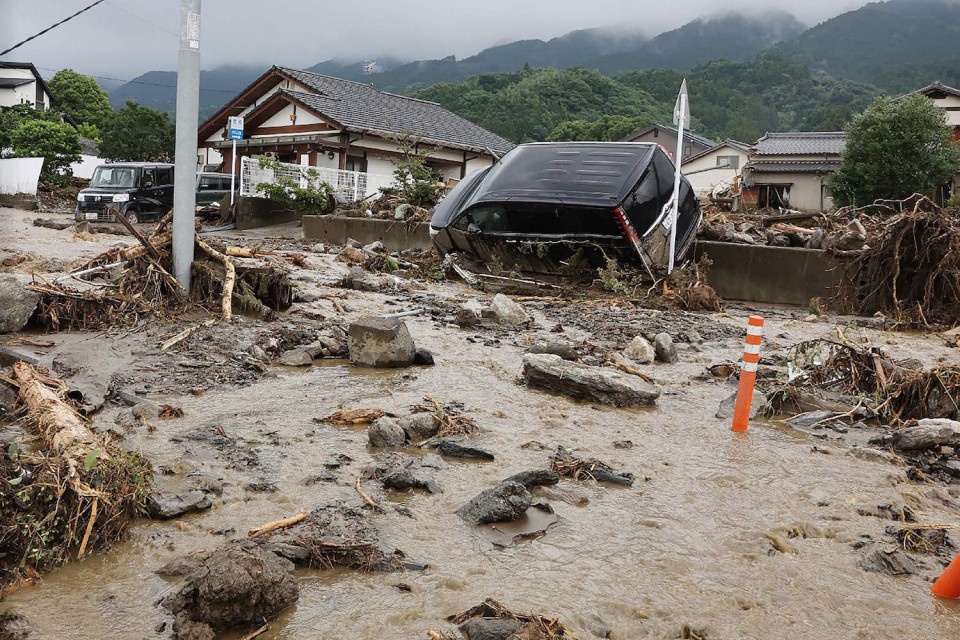
KURUME, Japan, July 10, 2023 (AFP) – At least two people were killed in torrential rain in southwest Japan on Monday, with fears the toll could rise, as tens of thousands of residents were told to evacuate their homes.
Downpours after a week of steady rain have caused rivers to burst their banks and sodden earth to collapse in deadly landslides, including one that killed a 77-year-old woman.
The woman’s home was engulfed overnight in Saga region, the local fire department told AFP. Her husband was recovered conscious and taken to hospital.
A landslide in Kurume city, Fukuoka region, swallowed 10 people. Nine of them survived, but a local man in his 70s was confirmed dead, the city’s disaster management official told AFP.
Separately, a male body was discovered also in Kurume, next to rice fields near a flooded river, according to the Yomiuri Shimbun and national broadcaster NHK.
In Hirokawa town in Fukuoka, the body of an elderly male was found inside a flooded vehicle trapped in an irrigation channel, the Yomiuri said.
Another woman was feared dead after last being seen clinging to a car in rising floodwaters in neighbouring Oita region, officials there said.
Rain in the region slowed or stopped by Monday afternoon. But earlier in the day, more than 420,000 people were put under a top-level evacuation warning stating: “Your life is in danger, you need to take action immediately.”
Nearly two million more in Fukuoka, Hiroshima, Saga, Yamaguchi and Oita were under a lower-level warning, urging them to evacuate if they were in hazardous areas.
Japan has five levels of evacuation orders, but people cannot be compelled to leave their homes.
“Rain and wind gusts were very, very strong. There was lightning. It was so horrible,” Takashi Onizuka, 62, of Tachiarai town near Kurume in Fukuoka told AFP.
The Japan Meteorological Agency (JMA) said the heavy downpours risked flooding and landslides across Fukuoka and Oita.
“This is the heaviest rain ever experienced” by the region, Satoshi Sugimoto of JMA’s forecast division told reporters.
“The situation is such that lives are in danger and safety must be secured,” he added.
– ‘People’s lives first’ –
Footage on national broadcaster NHK showed a gash in the hillside above a home in Karatsu City that had partly collapsed into a river, with many of its traditional roof tiles smashed or sliding off.
Images from elsewhere showed surging rivers washing over bridges that normally sit well above the waterline, and floodwater turning local streets into streams.
The prime minister’s office said a task force had been established to coordinate a response to the rains.
“We have received reports that several rivers have flooded… and that landslides have occurred in various parts” of the country, top government spokesman Hirokazu Matsuno told reporters.
“The government is doing its best to get a complete picture of the damage and taking measures under a policy of ‘people’s lives first’,” he added.
He warned torrential rain was forecast across much of the country on Tuesday.
“If you feel your life is in danger, even just a little, don’t hesitate to act,” he said.
In Fukuoka’s Asakura City, officials said the rain was believed to have peaked but there were still fears about flooding.
“Water levels in rivers are rising so we’re vigilant against the possibility of overflowing,” local official Takaaki Harano told AFP.
Japan is currently in its annual rainy season, which often brings heavy downpours, and sometimes results in flooding and landslides, as well as casualties.
Scientists say climate change is intensifying the risk of heavy rain in Japan and elsewhere, because a warmer atmosphere holds more water.
The weather agency said it had already been raining for more than a week in the region.
“The area is very wet due to intermittent rainfall for over a week,” Yoshiyuki Toyoguchi, land ministry official in charge of rivers, told reporters.
“Even with a little rain, river levels tend to rise quickly, which will increase risk of flooding.”
Landslides are a particular risk in Japan during heavy rains because homes are often built on plains at the bottom of hillsides in the mountainous country.
In 2021, rain triggered a devastating landslide in the central resort town of Atami that killed 27 people.
And in 2018, floods and landslides killed more than 200 people in western Japan during the rainy season.







